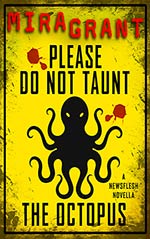
![]() Nymeria
Nymeria
4/18/2017
![]()
This novella marks the return of a great secondary figure from the Newsflesh trilogy, Dr. Shannon Abbey, a rogue virologist who keeps experimenting in search of a cure for the Kellis-Amberlee virus outside of the CDC-established parameters. Abbey is a wonderful character, brash, hard-nosed and harshly practical: she describes herself as an "annoyed scientist" as opposed to the "mad scientist" label pinned on her by detractors, and she works out of semi-clandestine labs that she must abandon, from time to time, due to security reasons. This has taught her the hard lesson of cutting your losses and starting again, and shares this attitude with her closest assistants, the ones that have stayed with her the longest and constitute the core of her little outlaw family.
The story is somewhat light-hearted in comparison with other offerings in the Rise collection, and even though it's not a humorous tale by a long shot, it's also a welcome respite from the more dramatic presentations in this anthology. In short, Shannon Abbey is continuing her work after the breakthrough offered by a chance discovery following Shaun Mason's visit to the lab with his team, and she rules over her little domain with firmness and a few well-placed dramatics (like the use of her huge dog Joe, a formidable deterrent if there ever was one). One day Dr. Abbey finds, in the woods surrounding the lab, a badly malnourished woman on the verge of collapse and she takes her inside, only to discover that her guest is part of a trap devised by a neighbor, the same ruler of the little underground kingdom we see in Feedback, ex-military turned despot Clive. He's not the only connection to Mira Grant's previous work, since in the course of the story we find out the real identity of the woman Abbey brought inside, someone we met in the novella The Day the Dead Came to Show and Tell, and this discovery leads to an exploration of post-traumatic stress and the ways to cope with dramatic loss.
The best feature of Please Do Not Taunt the Octopus, however, remains Dr. Abbey: I quite liked her in Deadline and Blackout, but here she is both point of view and narrating voice--and what a voice she has, indeed. Sarcastic and pragmatic, she also feels deeply for the people entrusted to her authority and the creatures in the lab--the scenes with the titular octopus are among the best, and helped me a great deal in metabolizing the dread and sadness that hit me after revisiting The Last Stand of the California Browncoats. There is a good measure of pain and loss in Dr. Abbey's past, and the small flashbacks help us understand how she came to be the person she is now, but the main emotion that information prompts is not so much pity as admiration for her strength and her willingness to fight back: that's why I 'm not surprised to learn that she is one of the author's favorite characters. She is now also mine, as well.
http://spaceandsorcery.wordpress.com